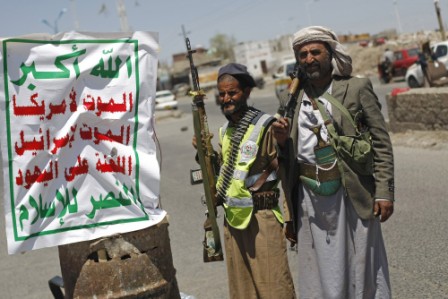Yemen rebels hail anniversary as coalition pounds Sanaa
Sanaa
Thousands of rebel sympathisers thronged the Yemeni capital on Monday to celebrate a year since the city's seizure, despite a relentless campaign of air attacks by a Saudi-led coalition.
Hours before the gathering, warplanes kept up their pounding of positions manned by the Iran-backed Shia Huthi rebels in Sanaa.
Six months of coalition strikes in support of exiled President Abedrabbo Mansour Hadi expanded in July into a ground operation, but the rebels still control much of north and central Yemen.
The Huthis declared September 21 a public holiday to mark the "revolution" as they sent a delegation to Oman for renewed consultations with UN special envoy Ismail Ould Cheikh Ahmed.
Several thousand sympathisers thronged Bab al-Yaman outside Sanaa's Old City after a call by rebel leader Abdulmalik al-Huthi.
His fighters overran Sanaa unopposed one year ago with the backing of renegade troops still loyal to Hadi's ousted predecessor Ali Abdullah Saleh.
Demonstrators waving Yemen's black, white and red flag -- with some also brandishing the yellow standard of Lebanon's Shiite Hezbollah movement -- gathered Monday in a festive atmosphere.
A display of songs and folk dancing also saw praise for Huthi "resistance" against "Saudi aggression" and denunciations of both the United States and Israel.
Earlier, witnesses said pre-dawn air strikes on Sanaa targeted Saleh supporters as well as the Huthis.
One raid went for the home of a leading lawmaker from Saleh's General People's Congress party, Ahmed al-Kahlani, they said.
Others targeted arms depots controlled by pro-Saleh units in the city's east.
Saleh is himself a Shiite, but the Huthis' alliance with the ousted strongman was widely seen as a marriage of convenience because they led repeated rebellions against his rule before his overthrow after a bloody Arab Spring-inspired uprising in 2011.
The rebels had urged a huge turnout to mark Monday's anniversary and to "prove to the world that the people stand by the leadership of the revolution".
- 'Rebellion will continue' -
Rebel leader Huthi said the rebellion will continue "until the country enjoys independence and stability" and "the people benefit from its wealth".
In a speech aired on rebel television, he welcomed diplomatic efforts as long as they "do not harm the national sovereignty, legitimise the aggression and lessen the rights of the Yemeni people".
The Huthis have lost five southern provinces to Hadi loyalists since July, and are battling an offensive in Marib province east of the capital.
They sent reinforcements on Monday from Sanaa to the flashpoint of Sirwah west of Marib city, military officials loyal to Hadi said.
Hundreds of rebels also headed for the central city of Taez where medical sources said bombing killed five civilians.
Loyalists and coalition air raids have killed 18 rebels since Sunday in attacks north and west of Marib, pro-government military sources said.
The toll could not be verified with independent sources.
The Marib offensive began after an early-September missile strike on a base in the province killed 67 coalition soldiers, including 52 Emiratis.
An analyst estimates that the coalition has more than 5,000 troops in Yemen, supporting local forces.
Prime Minister Khaled Bahah returned from exile to the main southern city of Aden last week, but has acknowledged his government still faces major challenges.
"The future challenge is how to prepare ourselves to defend this city and neighbouring provinces," he said.
Bahah said the armed forces need to be restructured nationally and "not on regional and partisan bases", an apparent reference to the north-south divide.
Southerners have traditionally complained of marginalisation, since northern forces crushed a secession attempt in the formerly independent South Yemen in 1994.
South Yemen was independent between the end of British colonial rule in 1967 and union with the north in 1990.
The United Nations says nearly 4,900 people have been killed since late March in Yemen. The UN aid chief has called the scale of human suffering "almost incomprehensible".
Related Posts

